Filter by
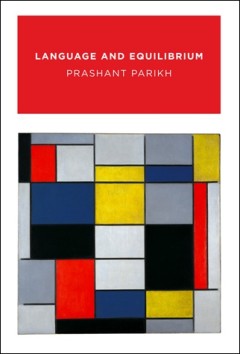
Language and Equilibrium
In this work, Prashant Parikh offers a new account of meaning for natural language. He argues that equilibrium, or balance among multiple interacting forces, is a key attribute of language and meaning and shows how to derive the meaning of an utterance from first principles by modelling it as a system of interdependent games.OCLC-licensed vendor bibliographic record.
- Edition
- -
- ISBN/ISSN
- 9780262281263
- Collation
- 1 online resource (xii, 344 pages) :illustrations
- Series Title
- -
- Call Number
- -
The generative lexicon
The Generative Lexicon presents a novel and exciting theory of lexical semantics that addresses the problem of the "multiplicity of word meaning"; that is, how we are able to give an infinite number of senses to words with finite means. The first formally elaborated theory of a generative approach to word meaning, it lays the foundation for an implemented computational treatment of word meaning…
- Edition
- -
- ISBN/ISSN
- 9780262281966
- Collation
- 1 online resource (xii, 298 pages).
- Series Title
- -
- Call Number
- 400 PUS g

Subjunctive Conditionals: A Linguistic Analysis
Ippolito proposes a compositional semantics for subjunctive (or would) conditionals in English that accounts for their felicity conditions and the constraints on the satisfaction of their presuppositions by capitalizing on the occurrence of past tense morphology in both antecedent and consequent clauses.OCLC-licensed vendor bibliographic record.
- Edition
- -
- ISBN/ISSN
- 9781461943273
- Collation
- 1 online resource (xii, 159 pages).
- Series Title
- -
- Call Number
- -
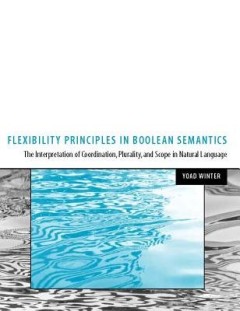
Flexibility Principles in Boolean Semantics: The Interpretation of Coordinati…
An investigation of the logical flexibility principles needed for a formal semantic account of coordination, plurality, and scope in natural language.Since the early work of Montague, Boolean semantics and its subfield of generalized quantifier theory have become the model-theoretic foundation for the study of meaning in natural languages. This book uses this framework to develop a new semantic…
- Edition
- -
- ISBN/ISSN
- 9780262286374
- Collation
- 1 online resource (x, 297 pages) :illustrations.
- Series Title
- -
- Call Number
- -

Meaning in the brain
An argument that the meaning of written or auditory linguistic signals is not derived from the input but results from the brain's internal construction process. When we read a text or listen to speech, meaning seems to be given to us instantaneously, as if it were part of the input. In Meaning in the Brain, Giosue Baggio explains that this is an illusion created by the tremendous speed at which…
- Edition
- -
- ISBN/ISSN
- 9780262347198
- Collation
- 1 online resource (xxiv, 348 pages) :illustrations (chiefly color)
- Series Title
- -
- Call Number
- -
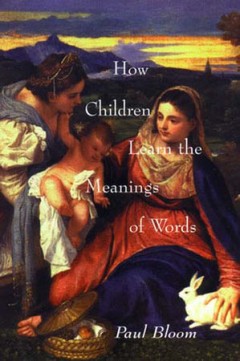
How children learn the meanings of words
How do children learn that the word "dog" refers not to all four-legged animals, and not just to Ralph, but to all members of a particular species? How do they learn the meanings of verbs like "think," adjectives like "good," and words for abstract entities such as "mortgage" and "story"? The acquisition of word meaning is one of the fundamental issues in the study of mind. According to Paul…
- Edition
- -
- ISBN/ISSN
- 9780262268783
- Collation
- 1 online resource (xii, 300 pages) : illustrations.
- Series Title
- Learning, Development, And Conceptual Change
- Call Number
- 400 BLO h
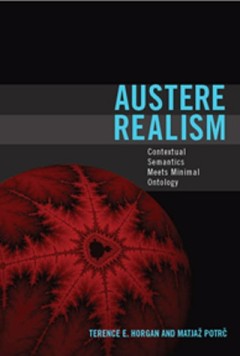
Austere realism Contextual Semantics Meets Minimal Ontology
This work presents a provocative ontological-cum-semantic position stating that the right ontology is austere in its exclusion of numerous common-sense and scientific posits and that many statements employing such posits are nonetheless true.
- Edition
- -
- ISBN/ISSN
- -
- Collation
- 1 online resource (x, 219 pages) : illustrations.
- Series Title
- -
- Call Number
- -

Supertagging :using complex lexical descriptions in natural language processing
The last decade has seen computational implementations of large hand-crafted natural language grammars in formal frameworks such as Tree-Adjoining Grammar (TAG), Combinatory Categorical Grammar (CCG), Head-driven Phrase Structure Grammar (HPSG), and Lexical Functional Grammar (LFG). Grammars in these frameworks typically associate linguistically motivated rich descriptions (Supertags) with word…
- Edition
- -
- ISBN/ISSN
- 9780262312486
- Collation
- 1 online resource (xxiii, 488 pages :illustrations)
- Series Title
- -
- Call Number
- -

Indefinite objects :scrambling, choice functions, and differential marking
A novel view of the syntax-semantics interface that analyzes the behavior of indefinite objects. In Indefinite Objects, Luis Lopez presents a novel approach to the syntax-semantics interface using indefinite noun phrases as a database. Traditional approaches map structural configurations to semantic interpretations directly; Lopez links configuration to a mode of semantic composition, with the …
- Edition
- -
- ISBN/ISSN
- 0262305631
- Collation
- 1 online resource (xi, 172 pages) :illustrations.
- Series Title
- -
- Call Number
- -
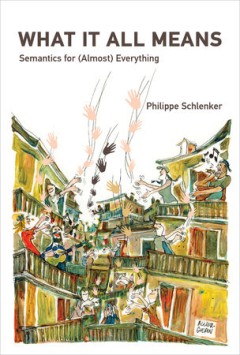
What it all means
"An introduction to semantics for the general reader. How things mean, from animal communication to music"--OCLC-licensed vendor bibliographic record.
- Edition
- -
- ISBN/ISSN
- 9780262371780
- Collation
- 1 online resource.
- Series Title
- -
- Call Number
- -
 Computer Science, Information & General Works
Computer Science, Information & General Works  Philosophy & Psychology
Philosophy & Psychology  Religion
Religion  Social Sciences
Social Sciences  Language
Language  Pure Science
Pure Science  Applied Sciences
Applied Sciences  Art & Recreation
Art & Recreation  Literature
Literature  History & Geography
History & Geography